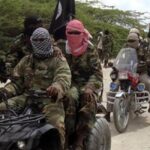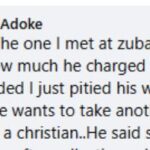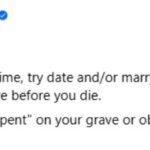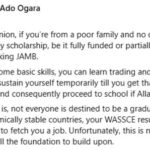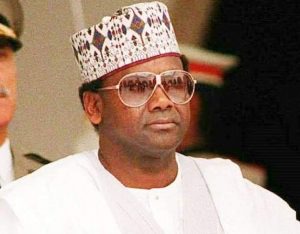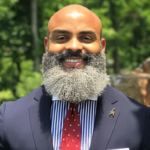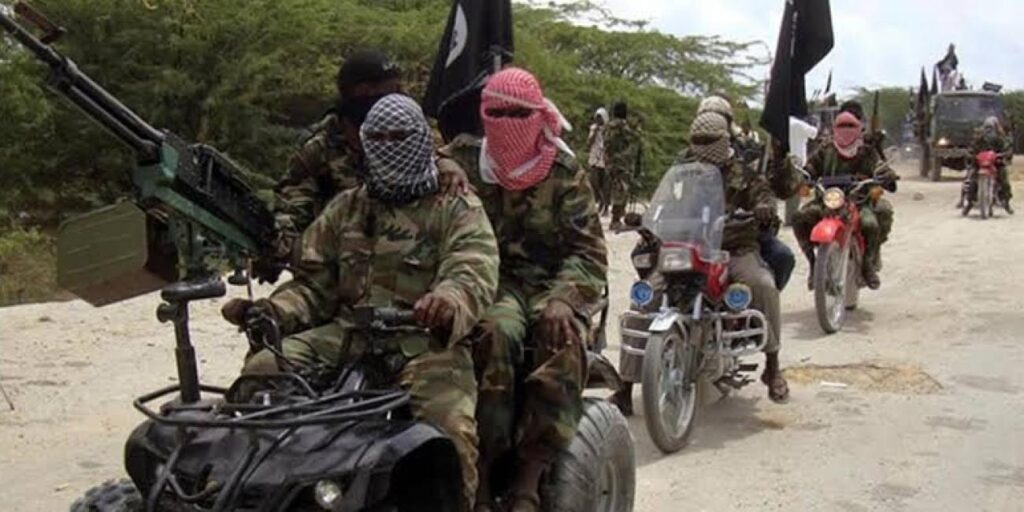He came at a time Nigerians were praying for a ‘change’. When he ascended the throne on November 17, 1993, it was with an air of discreet gentility. But five years later, Nigerians were writhing in pain. GABRIEL AKINADEWO writes on the 26th anniversary (June 8, 1998) of the day General Sani Abacha became history.
He never pretended that he was knowledgeable a la a university lecturer. He never told anyone that he had the intellectual capacity to solve Nigeria’s problems. He was, first and last, a soldier. A tough one for that matter. His hold on Nigerians was unquestionably colossal, brutal and maximum.
When General Sani Abacha became the 10th Commander-in-Chief of the most-populous black nation on November 17, 1993, all those who knew him believed that it wouldn’t be long before Nigerians knew that they were in for a tough time. And for close to five years, Abacha really showed them the stuff he was made of.
he first thing he did was to trick the winner of the June 12, 1993 presidential election, the late Chief Moshood Kashimawo Olawale (M.K.O.) Abiola, to send representatives that would serve in his regime.
This pact led to the entrance of Chief Ebenezer Babatope, Alhaji Lateef Jakande and Chief Olu Onagoruwa as ministers.
When Abiola realised that he was riding on a tiger’s back, it was too late. With agitation for the revalidation of Abiola’s mandate reaching a peak, Abacha came out smoking.
Some people were sent into exile, a few killed. Others were clamped in detention. Nigerians were not sure of their future.
Abacha’s style of leadership, especially his foreign policy, led to the suspension of Nigeria from The Commonwealth.
Nigeria became a pariah nation.
What he lacked at home, he preached abroad. There was no democracy in the land but the dark-goggled General went to Liberia to witness the inauguration of Charles Taylor as President. He also sent soldiers to Sierra Leone to restore Teejan Kabba.
To his credit, Abacha tackled youth restiveness in the Niger Delta. All the militants became ‘born again’ youths when they realised he was ready to level the South-South geo-political zone with his no-nonsense aggressive military policy.
Nigeria also won the Nations Cup in 1994 and participated in the World Cup for the first time same year.
In 1996, the Under-23 football team won the gold medal during the Atlanta Olympics Games with Chioma Ajunwa winning gold in the long jump.
British Airways
When the British Airways engaged in a battle of supremacy with the Federal Military Government (FMG), Abacha sent the airline packing.
It was in this state of panic that Nigeria was when ‘something unexpected’ happened on June 8, 1998.
Those who referred to Abacha as the most hated ruler in Nigerian history, in and out of office, were vindicated on that Monday when the news of his death hit the streets.
There is the age-long belief that you don’t rejoice over the dead, an unwritten rule that you must not speak ill of the dead.
But 26 years ago, many Nigerians flouted that rule. To them, they were only following the footsteps of Abacha who never respected any rule while in office.
On June 7, 1998, Abacha received the Leader of Palestine Liberation Organisation (PLO), the late Yasser Arafat, at the Nnamdi Azikiwe International Airport, Abuja.
Arafat was on his way to attend a meeting of the Organisation of African Unity (OAU), now African Union (AU), in Burkina Faso.
That was the last time Nigerians saw Abacha alive.
The next day, the main event in Abuja was the official opening of a three-day seminar on a new information strategy. Abacha was billed to declare it open at the International Conference Centre (ICC), Abuja.
As usual, security was very tight. Stern-looking soldiers and security men, some wearing Russian-made long jackets, frisked journalists and participants entering the hall.
Abacha
Obviously, they were oblivious of what happened a few hours earlier at The Villa.
Although Abacha suffered from liver cirrhosis, there were various versions of the circumstances surrounding the death of one of the most successful coup plotters in Nigerian history.
For reasons bordering on the phobia of power loss, he snubbed medical options of treating himself properly abroad.
Known as The Khalifa, he relied on special prayers from marabouts, mullahs, seers, sorcerers and spiritualists from Saudi Arabia, Egypt, Sudan, Chad and Niger.
Aside collecting money and contracts, they couldn’t save him that day.
Meanwhile, there was tension in the land, especially in the South-West because it was widely speculated that Abacha was going to sign the death sentence of Lt. Gen. Oladipo Diya, Major-Generals Abdulkareem Adisa, Tajudeen Olanrewaju and others; retirement of the then Major-General Abdulsalami Abubakar, Rear Admiral Mike Akhigbe and others; and the dethronement of the Emir of Kano, Ado Bayero, that morning.
The first indication that something was wrong was the unusual holiday declared for workers in the Villa at 9a.m. with military presence beefed up.
Aso Rock was barricaded against all ‘bloody civilians’, including those on scheduled appointments and State House correspondents.
The newshounds quickly jumped into conclusion that there was a change of government. Some of them had already contacted their head offices in Lagos. At noon, those who had been waiting for Abacha at the Conference Centre, were ordered to leave ‘at once’.
The atmosphere became charged with the repeated announcement on the Cable News Network (CNN): ‘The office of the Nigerian Head of State has been sealed off by the military and the whereabouts of General Sani Abacha unknown’.
Abdulsalami Abubakar
Later, Abubakar, the then Chief of Defence Staff, announced that ‘The Head of State, General Sani Abacha, passed away in the early hours of this morning’.
Initially, some Nigerians thought the announcement was a dangerous replay of the Idi Amin strategy.
In mid 70s, the late General Idi Amin Dada (Big Daddy), due to his unpopularity, would force the Ugandan Radio Station to announce his death and when people came out to celebrate, they would be rounded up by his agents and policemen, tried and jailed “for jubilating that the ‘Conqueror of the British Empire’ is dead”.
When it dawned on Nigerians that Abacha had indeed gone for good, their fear turned to joy.
Many saw his death as having a divine colouration. A few months before then, the late Pope John Paul II was in Nigeria to beg Abacha to release political prisoners, but he refused.
In Abuja, the reaction of the people was not that loud because Abacha’s security agents were everywhere.
As early as 4 p.m., Abuja streets were deserted, with people speaking in hushed tones.
But in Lagos, where a week before, Abacha had failed to honour a highly-publicised official visit, the reaction was wild and spontaneous with shouts of ‘Abacha ti lo si empire’ (Abacha has gone to the empire).
People broke the news to others, shaking hands and saying ‘Happy New Year’.
The song ‘Abacha rele o’ (Abacha has gone home) was changed to Abacha rena o (Abacha has entered fire).
People begged others to accept free drinks and in the process, many Lagosians got drunk.
Commercial drivers conveyed passengers free. Some soldiers and policemen were not left out as they fired shots into the air to celebrate Abacha’s demise.
Workers in YEAA’s (Youths Earnestly Ask for Abacha) offices nationwide hurriedly left to avoid the wrath of the celebrating masses.
In Kano, there was subdued jubilation, which almost led to a crisis among street urchins.
Mohammed Dan Kano (Abacha’s school mate) wept when he heard the news.
But for the Emir of Kano, it was a mixture of joy and sadness.
Joy in the sense that it was the week he was to be dethroned that Abacha died. So, he was saved what former Sultan of Sokoto, Ibrahim Dasuki, went through 26 months earlier.
But sadness in the sense that Abacha and the late General Murtala Muhammed were Kano indigenes.
Both ruled the country and they died in office. Muhammed on February 13, 1976 from the bullets of Lt. Col. Bukar Sukar Dimka and his fellow coupists.
Abacha on June 8 1998.
While Muhammed was the third Nigerian leader (after Tafawa-Balewa and Aguiyi-Ironsi) to be killed in office, Abacha was the first to die a natural death.
So, Abacha’s death made Bayero to be the only traditional ruler in Nigerian history to bury two heads of state and their sons.
In the military, Abacha’s sudden death caused a little problem bordering on who would succeed him.
Diya, who was the Chief of General Staff, would have succeeded Abacha but he was already awaiting a death sentence.
Four people: Abubakar, Lt. Gen Jeremiah Useni (then Federal Capital Territory Minister), Major-General Ishaya Bamaiyi (Chief of Army Staff) and Akhigbe (Chief of Naval Staff) were considered.
While Abubakar was holding the most senior military position, Useni was the most senior officer.
Bamaiyi had been indicted by Diya during the coup trial and Akhigbe came from a constituency (Navy) that naturally does not present the Head of State.
Then, General Ibrahim Babangida (rtd) stepped in.
He contacted all the senior military officers. Military planes were sent to convey them to Abuja.
In the evening, four aircraft – a presidential jet conveying Abacha’s body, one for ministers and military officers, a cargo plane carrying Abacha’s property and a Charlie plane – left the Abuja airport to Kano and waiting for them was Babangida who assumed the title of the ‘Chief Mourner’.
But Bayero refused to have the body brought to the palace for prayers. Instead, it was taken to the Race Course where the Chief Imam of Kano, Sheik Idris Kuliya Alkali, led the prayers.
Abacha was eventually buried in his palatial home at Gidado Avenue in Nasarawa GRA Quarters, Kano at 9.45p.m.
Shortly after the burial, Babangida convened a meeting of the military officers and Abubakar was chosen as Abacha’s successor.
They all departed for Abuja and Abubakar was sworn in immediately by the then Chief Justice of Nigeria (CJN), Mohammed Lawal Uwais.
For many years, the Khalifa made history.
Today, he is history.
SYNOPSIS
1. General Abacha was the longest serving Chief of Army Staff 1985-1990
2. He was the first and only military officer to hold the position of Chief of Army Staff, Minister of Defence and Chairman, Joint Chiefs of Staff at the same time.
3. Abacha was the longest serving member of the Supreme Military Council (SMC), Armed Forces Ruling Council (AFRC) and Provisional Ruling Council (PRC), 1983-1998.
4. He served as Minister of Defence and Commander of the Armed Forces when there was a sitting ‘Commander-in-Chief’, Chief Ernest Shonekan.
5. He was, perhaps, the richest serving military officer in Nigeria. His wife, Maryam, openly defended his wealth by admitting that General Abacha started business when he was just a Lieutenant Colonel.
6. Twenty six years after his death, millions of dollars and pound sterling hidden in foreign bank accounts by his regime are still being recovered by the Nigerian Government.




